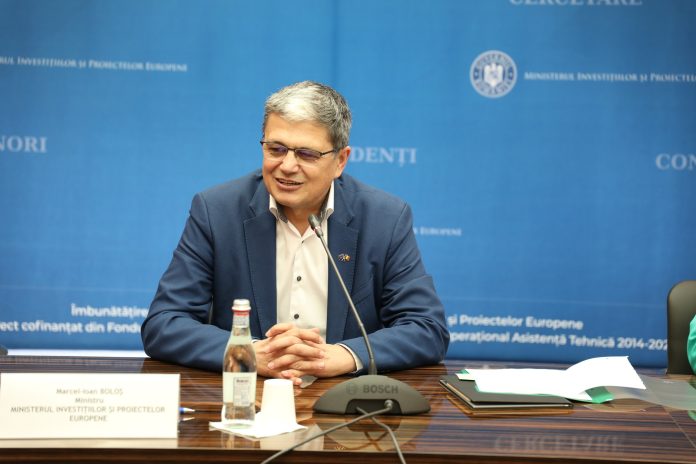The degree of absorption of European funds in the 2014 – 2020 financial year currently recorded by Romania stands at 64.7 percent, Minister of Investments and European Projects Marcel Bolos told a press conference on Friday, in Tulcea, according to Agerpres.
He voiced his regret that the non-reimbursable financing has not resulted in a road and utility infrastructure developed at the national level and that Romania is confronted with the risk of losing over 9 billion EUR.
„Now we have 64.7 percent, but in the latest updates the degree of absorption may be a little higher. We have 9.2 billion EUR at risk of being decommitted, compared to 12 billion EUR when we took over the mandate. We took steps to reduce this risk. This year, we adopted a set of measures to prevent a possible massive loss of money which we anticipated for the end of 2023,” Minister Marcel Bolos stated.
The official brought to mind that, this year, the European Commission supported the member states through a package of measures aimed at granting vouchers for energy poverty intended for vulnerable people and families, and this and two other categories of measures enforced by Romania, namely the grants for the working capital and the measures regarding the increase of labor force’s employment, will lead to the increase in the degree of absorption of the European funds.
„With these three categories of measures, we will be better off and I hope to exceed, to stand between 90 and 95 percent in terms of absorption. My regret as a minister is the fact that this money, instead of seeing it on transport infrastructure or water, sewerage, because we did not prepare it ahead of time in the beginning of the 2014-2020 programming period, we are in this situation where we have to find alternatives to avoid losing money,” the Investments and European Projects Minister stated.
At the same time, he underscored the importance of a modern road infrastructure for the development of communities.
„The Moldavian highway, which has 319 kilometers and 4 billion EUR, currently undergoes a process of concluding work contracts and the commitment of the Ministry of Transport is that by the end of the year, these contracts be concluded and I hope with all my heart for the region of Moldavia that the project be implemented. It is vital for the development of Moldavia and Romania, because otherwise the imbalances will not decrease, but will deepen,” Minister Bolos stated.
The minister signed, on Friday morning, at the Tulcea City Hall, the funding contract of a regional project for the development of the water and sewerage infrastructure in the county, which has a total budget of approximately 250 million EUR.
Agerpres


